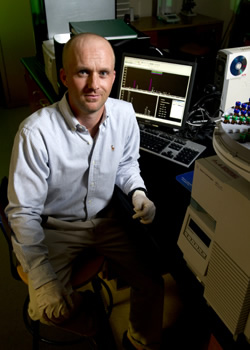 Michael Foster, a doctoral candidate in the biology department, is fascinated with
the spread of diseases in populations. He thinks it is necessary to find out how disease
spreads throughout a population in order to better prevent it. Foster studies the
worldwide bacteria H. pylori. Fifty to sixty percent of the earth's population is believed to be a carrier of
it.
Michael Foster, a doctoral candidate in the biology department, is fascinated with
the spread of diseases in populations. He thinks it is necessary to find out how disease
spreads throughout a population in order to better prevent it. Foster studies the
worldwide bacteria H. pylori. Fifty to sixty percent of the earth's population is believed to be a carrier of
it.
Foster says that the numbers vary depending on the part of the world.
"The more developed a country is, the less prevalent the bacteria will be," Foster said.
Up to 90 percent of the population in Indonesia are carriers. The bacterium is a major public health concern even in the United States, though. It can cause stomach ulcers and cancer. Humans can live with the bacteria their entire lives if it is left untreated.
Foster's research involves finding this bacterium in the North Texas watershed. He and other students on his research team are studying the bug to see if its presence changes geographically and seasonally. They hunt the bug's DNA in order to find it in the water.
The team is made up of students from many disciplines; microbiology, molecular biology and epidemiology are just a few. Each person on the team is from a different field.
Fosters says that it is not certain if water treatment plants are catching the H. pylori before the water goes out to the public.
"If a human gets the bacteria it can't be treated effectively with one drug," Foster said. "There are multiple treatments/pharmaceuticals involved."
A chemical called urease is produced by the bacteria to help protect itself from the hostile environment of the gut. These bacteria create their own micro environment in the stomach. The presence of urease can be detected by using a blow test in a doctor's office.
Foster also works with his mentor, Dr. Duane Huggett on his research. Huggett is a professor in the biology department.
"I am very fortunate to find a professor who is willing to work with me on my research," Foster said.
Foster says that the whole research project was Huggett's idea, but it has been modified over time to fit Foster's specific research interest.
"He is super easy to work with and a wonderful mentor," Foster said. "But you have to show initiative."
Foster says that if a student needs help, Huggett will bend over backwards to help them. He gives Foster the freedom to study his own ideas and encourages him to try new things and make mistakes.
Foster received his Bachelor of Science in biology and chemistry, and his Master of Science in public health with a concentration in community health and epidemiology.
He plans to go to medical school when he is done with his Ph.D. His masters and Ph.D will be directly relevant to his medical school work. He plans on doing his dissertation work on H. pylori.
Foster has received the Beth Beard and Academic Achievement scholarships.
In his spare time, he works as a volunteer tutor in the Learning Center. He also runs ultra marathons and races mountain bikes.